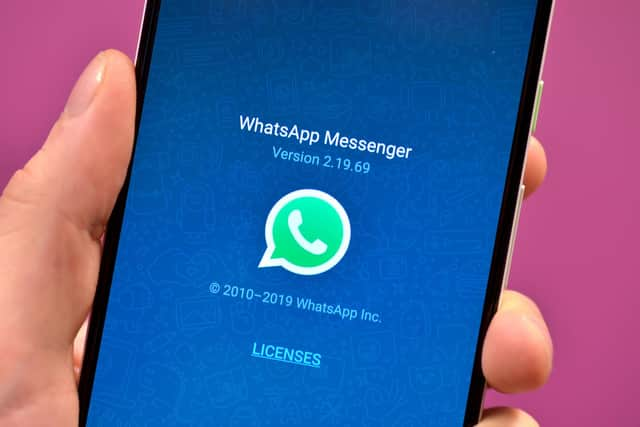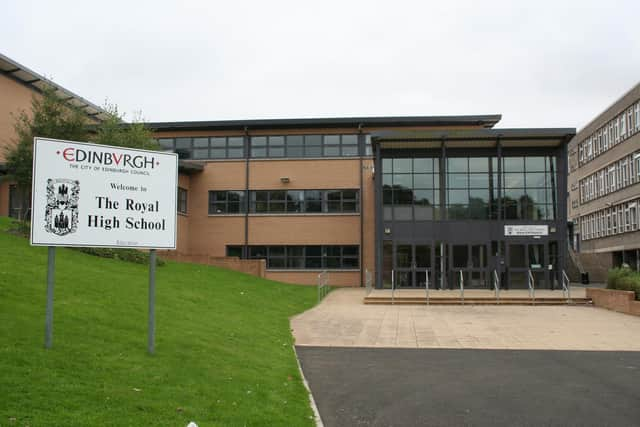Education Scotland: How mobile phone bans are generating a new 'buzz' in Scottish schools
Mobile phone bans have been coming into force in schools across much of the country in recent months, with tighter restrictions expected to become widespread in 2024.
The move follows growing demands for stricter policies in the wake of a series of recent reports highlighting the damaging impact of the devices on learning.
Advertisement
Hide AdAdvertisement
Hide AdUnesco, the UN's education, science and culture agency, warned in July that smartphones cause distraction, a risk to pupil privacy and lead to cyber-bullying.


In Scotland, a long-awaited study on deteriorating school behaviour in November found it was one of the most frequently raised issues among secondary teachers, with 88 per cent dealing daily with pupils looking at phones instead of paying attention in class.
There have also been growing concerns about the filming of violent incidents among pupils, with footage then being posted on social media.
Meanwhile, in December the Organisation for Economic Co-operation and Development (OECD) linked rising misuse of such technology to the declining performance of many countries, including Scotland, in the respected Pisa tests of the performance of 15-year-olds in maths, science and reading.
In England, Education Secretary Gillian Keegan has already unveiled plans to ban phones in schools.


North of the border, her SNP counterpart Jenny Gilruth recently vowed to produce new guidance that would “empower” head teachers to ban phones if they believed it was necessary.
However, such restrictions are already effectively in place at many schools across the nation, with others in the process of introducing new rules.
Pauline Walker, head teacher at the Royal High School in Edinburgh and vice president of School Leaders Scotland, said: "I think schools are already on this. I think most schools are doing something about it at the moment.”
Advertisement
Hide AdAdvertisement
Hide AdStaff at the Royal High had a policy in place whereby phones were not permitted in the school day, apart from at break and lunch, and they have been cracking down in recent weeks.
"What we did from the beginning of November is that we enforced that. We were finding that more and more of them were just sneaking out phones so we just put an enforcement in from November where if a phone is seen during the school day, it is removed from them and they don’t get it back until 3.30pm,” said Ms Walker.”We pretty much don’t get anybody breaching that now. Once they know you are serious they pretty much just get on with it.
"The parents were highly supportive. There is no argument about allowing them to have phones in classes, because they should be learning.
"We’re allowing them at break and lunch, so they are having the opportunity to contact home, or the sort of things they need to do for anxiety and so on.
"So there has not been an issue at all. It has really been brilliant to be honest, because we were finding it quite disruptive with the phones.
"They were either trying to check them during class, or they were coming out to the toilet all the time so they could check their phone.
"By having that blanket ban during school time it just means that it has gone. They know they can’t do it so they don’t do it.”
Knox Academy in Haddington is another school which has taken action, after surveys suggested there was a desire to limit use of smartphones during the day.
Advertisement
Hide AdAdvertisement
Hide AdBefore taking the decision, a questionnaire was circulated to pupils regarding their use of phones, while a series of assemblies were also held, as well as sessions with parents, the parent council and staff.
It was agreed that mobile use at Knox Academy would be restricted to the social space and outside of the school day.
Mobile-free zones include classrooms, the PE department, corridors, lunch hall and library.
"Feedback to date suggests that this approach is working well with the dining hall in particular having a ‘buzz’ as young people enjoy discussion with each other and positive interactions with each other in class,” a council spokesman said.
Dunbar Grammar School, also in East Lothian, has taken similar action on smartphones.
A consultation was held into mobile phone policy at the school, with feedback received from parents and carers, students and staff.
As a result, pupils in S1 and S2 are now not permitted to use their phones in lessons, with the devices instead to be be kept in bags at all time.
Students in S3 to S6 can only use their phones as part of planned learning, with their teacher’s permission.
Advertisement
Hide AdAdvertisement
Hide AdPhones should not be used whilst walking along corridors and up or down stairs. At break and lunch students can use their mobile phones if seated in one of the social areas.Other schools took action much earlier, including Gordonstoun in Moray, the independent school attended by King Charles.
Lisa Kerr, its principal, wrote about Gordonstoun’s decision in 2017 to restrict the use of phones to evenings, saying the impact was “immediately obvious”, with the school becoming noisier as children spoke to each once again, rather than scrolling through their phone.
Other independent schools in Scotland are currently understood to be consulting with parents on tighter restrictions.
However, Ms Walker cautioned against believing that banning phones would solve issues relating to poor behaviour and falling Pisa scores, describing those links as “tenuous”, in her experience at the Royal High.
"I think in general obviously social media is an issue for young people. There is a rise in issues around bullying in social media,” she said.
"That is obviously an issue, but I would find it difficult, certainly in my school, to find a link between behaviour and mobile phones, or indeed (Pisa) results and mobile phones.”
Comments
Want to join the conversation? Please or to comment on this article.
